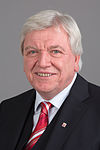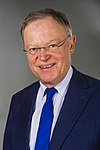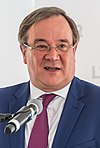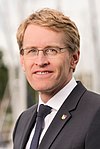User:Alektor89/sandbox
| President by right of age of the Bundestag | |
|---|---|
| Alterspräsident des Deutschen Bundestages | |
 | |
since 26 December 2023 | |
| Presidium of the Bundestag | |
| Style | Mr. President (when addressed in the Bundestag) |
| Type | Presiding officer |
| Status | acting |
| Seat | Reichstag building, Berlin |
| Term length | Contemporaneous to legislative period |
| Constituting instrument | Standing rules of the German Bundestag |
| Formation | 7 September 1949 |
| First holder | Paul Löbe |
| Deputy | next longest serving member of the Bundestag |
| Website | www.bundestag.de |
The President by right of age (Alterspräsident) is the longest-serving member of the german Bundestag (until 2017 the oldest by age).
Role
[edit]The role of the President by right of age is defined in the standing rules of the Bundestag: Currently (since 2017), the position is held by the longest-serving member of parliament, with discontinuous terms of office being added together. If two members of parliament have been in office for the same length of time, age is decisive. Before a change to the standing rules in 2017, the position was held by the oldest member. He or she shall preside over the Bundestag during the opening session of each legislative term until the President of the Bundestag has been elected; for this purpose, he is authorized to appoint temporary secretaries, who remain in office until the election of regular secretaries in a later session.[1] Apart from the opening session, he or she shall also preside over the Bundestag at any given time, if both the President and all Vice Presidents are incapable of attending.[2] However, the latter case has never occurred, as of 2024.
It is common practice for the President by right of age to give the first speech of the new legislative period, in which he outlines what he considers to be important tasks for Parliament in the coming years.
There have been cases in which the longest-serving or oldest MP has declined to hold the position: Konrad Adenauer, for example, who was the oldest member of the Bundestag for many years, set the precedent of a sitting chancellor renouncing the dignity. In this case, according to standing rules, he is replaced by the MP who has served the second longest time (previously: the next oldest).
List of Presidents by right of age of the Bundestag
[edit]| # | Portrait | Name | member of parliament (since 2017) | Term of Office | Time in office | Parliamentary Group | Legislative periods | Notes |
|---|---|---|---|---|---|---|---|---|
| 1 | 
|
Paul Löbe (1875–1967) |
7 September 1949 – 7 September 1953 |
4 years, 0 days | SPD | 1st | ||
| 2 | 
|
Konrad Adenauer (1876–1967) |
6 October 1953 – 19 April 1967 |
13 years, 195 days | CDU/CSU | 2nd, 3rd, 4th, 5th | During the 2nd, 3rd and 4th legislative periods, Adenauer refrained from presiding over the opening session due to his position as Chancellor. In each case, the function was assumed by the next longest-serving member of parliament: In the 2nd and 3rd Bundestag this was Marie Elisabeth Lüders (FDP, 1878–1966) and in the 4th Bundestag Robert Pferdmenges (CDU/CSU, 1880–1962) | |
| 3 | Arthur Enk (1894–1976) |
19 April 1967 – 20 October 1969 |
2 years, 184 days | CDU/CSU | 5th | Enk became the oldest member of parliament due to the death of Adenauer in the middle of the current legislative period; he never presided over the Bundestag | ||
| 4 | William Borm (1895–1987) |
20 October 1969 – 13 December 1972 |
3 years, 54 days | FDP | 6th | |||
| 5 | 
|
Ludwig Erhard (1897–1977) |
13 December 1972 – 5 May 1977 |
4 years, 143 days | CDU/CSU | 7th, 8th | ||
| 6 | 
|
Johann Baptist Gradl (1904–1988) |
5 May 1977 – 4 November 1980 |
3 years, 183 days | CDU/CSU | 8th | Gradl became the oldest member of parliament due to the death of Erhard in the middle of the current legislative period; he never presided over the Bundestag | |
| 7 | 
|
Herbert Wehner (1906–1990) |
4 November 1980 – 29 March 1983 |
2 years, 145 days | SPD | 9th | ||
| 8 | 
|
Egon Franke (1913–1995) |
29 March 1983 – 18 February 1987 |
3 years, 326 days | SPD | 10th | Franke refrained from presiding over the opening session of the 10th Bundestag as he was under investigation for embezzlement at the time (he was later acquitted). The function was assumed by the next oldest member of parliament, Willy Brandt (SPD, 1913–1992) | |
| 9 | 
|
Willy Brandt (1913–1992) |
18 February 1987 – 8 October 1992 |
5 years, 233 days | SPD | 11th, 12th | ||
| 10 | 
|
Alfred Dregger (1920–2002) |
8 October 1992 – 10 November 1994 |
2 years, 33 days | CDU/CSU | 12th | Dregger became the oldest member of parliament due to the death of Brandt in the middle of the current legislative period; he never presided over the Bundestag | |
| 11 | 
|
Stefan Heym (1913–2001) |
10 November 1994 – 31 October 1995 |
355 days | PDS | 13th | ||
| 12 | 
|
Alfred Dregger (1920–2002) |
31 October 1995 – 26 October 1998 |
2 years, 360 days | CDU/CSU | 13th | Dregger became the oldest member of the Bundestag, as Heym had resigned his seat; he never presided over the Bundestag | |
| 13 | Fred Gebhardt (1928–2000) |
26 October 1998 – 16 August 2000 |
1 year, 295 days | PDS | 14th | |||
| 14 | 
|
Hans-Eberhard Urbaniak (born 1929) |
16 August 2000 – 17 October 2002 |
2 years, 62 days | SPD | 14th | Urbaniak became the oldest member of parliament due to the death of Gebhardt in the middle of the current legislative period; he never presided over the Bundestag | |
| 15 | 
|
Otto Schily (born 1932) |
17 October 2002 – 27 October 2009 |
7 years, 10 days | SPD | 15th, 16th | ||
| 16 | 
|
Heinz Riesenhuber (born 1935) |
27 October 2009 – 24 October 2017 |
7 years, 362 days | CDU/CSU | 17th, 18th | ||
| 17 | 
|
Wolfgang Schäuble (1942–2023) |
1972–2023 | 24 October 2017 – 26 December 2023 |
6 years, 63 days | CDU/CSU | 19th, 20th | Schäuble refrained from presiding over the opening session of the 19th Bundestag as he stood for election as president of the Bundestag and did not want to preside over his own election. The function was assumed by the next longest-serving member of parliament, Hermann Otto Solms (FDP, 1980–2013 and 2017–2021) |
| 18 | 
|
Peter Ramsauer (born 1954) |
since 1990 | since 26 December 2023 | 329 days | CDU/CSU | 20th | Ramsauer became the longest serving member of parliament due to the death of Schäuble in the middle of the current legislative period; as yet, he has not presided over the Bundestag |
Weblinks
[edit]Standing rules of the German Bundestag
| # | Portrait | Name (Birth–Death) |
Term | Party | Election | Deputies (Presidents of the Bundesrat) | |||
|---|---|---|---|---|---|---|---|---|---|
| President of the Bundesrat Karl Arnold served as acting head of state from 7 September to 12 September 1949. | |||||||||
| 1 | 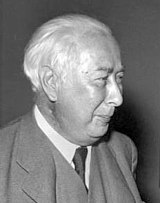
|
Theodor Heuss (1884–1963) |
September 12, 1949 – September 12, 1959 |
FDP | 1949 | Karl Arnold (1949–1950) Hans Ehard (1950–1951) Hinrich Wilhelm Kopf (1951–1952) Reinhold Maier (1952–1953) Georg August Zinn (1953–1954) Peter Altmeier (1954–1955) Kai-Uwe von Hassel (1955–1956) Kurt Sieveking (1956–1957) Willy Brandt (1957–1958) Wilhelm Kaisen (1958–1959) | |||
| 1954 | |||||||||
| 2 | 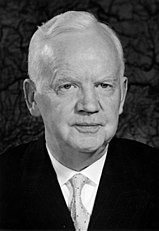
|
Heinrich Lübke (1894–1972) |
September 13, 1959 – June 30, 1969[a] |
CDU | 1959 | Wilhelm Kaisen (1959) Franz Josef Röder (1959–1960) Franz Meyers (1960–1961) Hans Ehard (1961–1962) Kurt Georg Kiesinger (1962–1963) Georg Diederichs (1963–1964) Georg August Zinn (1964–1965) Peter Altmeier (1965–1966) Helmut Lemke (1966–1967) Klaus Schütz (1967–1968) Herbert Weichmann (1968–1969) | |||
| 1964 | |||||||||
| 3 | 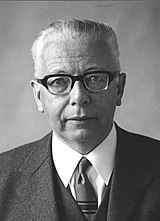
|
Gustav Heinemann (1899–1976) |
July 1, 1969 – June 30, 1974 |
SPD | 1969 | Herbert Weichmann (1969) Franz Josef Röder (1969–1970) Hans Koschnick (1970–1971) Heinz Kühn (1971–1972) Alfons Goppel (1972–1973) Hans Filbinger (1973–1974) | |||
| 4 | 
|
Walter Scheel (1919–2016) |
July 1, 1974 – June 30, 1979 |
FDP | 1974 | Hans Filbinger (1974) Alfred Kubel (1974–1975) Albert Osswald (1975–1976) Bernhard Vogel (1976–1977) Gerhard Stoltenberg (1977–1978) Dietrich Stobbe (1978–1979) | |||
| 5 | 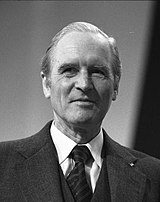
|
Karl Carstens (1914–1992) |
July 1, 1979 – June 30, 1984 |
CDU | 1979 | Dietrich Stobbe (1979) Hans-Ulrich Klose (1979–1980) Werner Zeyer (1980–1981) Hans Koschnick (1981–1982) Johannes Rau (1982–1983) Franz Josef Strauß (1983–1984) | |||
| 6 | 
|
Richard von Weizsäcker (1920–2015) |
July 1, 1984 – June 30, 1994 |
CDU | 1982 | Franz Josef Strauß (1984) Lothar Späth (1984–1985) Ernst Albrecht (1985–1986) Holger Börner (1986–1987) Walter Wallmann (1987) Bernhard Vogel (1987–1988) Björn Engholm (1988–1989) Walter Momper (1989–1990) Henning Voscherau (1990–1991) Alfred Gomolka (1991–1992) Berndt Seite (1992) Oskar Lafontaine (1992–1993) Klaus Wedemeier (1993–1994) | |||
| 1989 | |||||||||
| 7 | 
|
Roman Herzog (1934–2017) |
July 1, 1994 – June 30, 1999 |
CDU | 1994 | Klaus Wedemeier (1994) Johannes Rau (1994–1995) Edmund Stoiber (1995–1996) Erwin Teufel (1996–1997) Gerhard Schröder (1997–1998) Hans Eichel (1998–1999) Roland Koch (1999) | |||
| 8 | 
|
Johannes Rau (1931–2006) |
July 1, 1999 – June 30, 2004 |
SPD | 1999 | Roland Koch (1999) Kurt Biedenkopf (1999–2000) Kurt Beck (2000–2001) Klaus Wowereit (2001–2002) Wolfgang Böhmer (2002–2003) Dieter Althaus (2003–2004) | |||
| 9 | 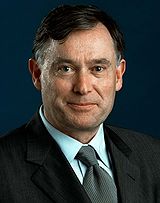
|
Horst Köhler (b. 1943) |
July 1, 2004 – May 31, 2010[b] |
CDU | 2004 | Dieter Althaus (2004) Matthias Platzeck (2004–2005) Peter Harry Carstensen (2005–2006) Harald Ringstorff (2006–2007) Ole von Beust (2007–2008) Peter Müller (2008–2009) Jens Böhrnsen (2009–2010) | |||
| 2009 | |||||||||
| President of the Bundesrat Jens Böhrnsen served as acting head of state from 31 May to 30 June 2010. | |||||||||
| 10 | 
|
Christian Wulff (b. 1959) |
June 30, 2010 – February 17, 2012[c] |
CDU | 2010 | Jens Böhrnsen (2010) Hannelore Kraft (2010–2011) Horst Seehofer (2011–2012) | |||
| President of the Bundesrat Horst Seehofer served as acting head of state from 17 February to 18 March 2012. | |||||||||
| 11 | 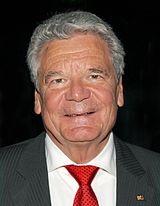
|
Joachim Gauck (b. 1940) |
March 18, 2012 – March 18, 2017 |
Independent | 2012 | Horst Seehofer (2012) Winfried Kretschmann (2012–2013) Stephan Weil (2013–2014) Volker Bouffier (2014–2015) Stanislaw Tillich (2015–2016) Malu Dreyer (2016–2017) | |||
| 12 | 
|
Frank-Walter Steinmeier (b. 1956) |
March 19, 2017 – Incumbent |
SPD | 2017 | Malu Dreyer (2017) Michael Müller (2017–2018) Daniel Günther (2018–2019) Dietmar Woidke (2019–2020) Reiner Haseloff (2020–2021) Bodo Ramelow (incumbent) | |||
| Sources: | |||||||||
- ^ On 14 October 1968, Lübke announced his resignation with effect to 30 June 1969, to make possible the election of his successor before the federal election campaign in the fall of 1969.
- ^ On 31 May 2010, Köhler declared his resignation with immediate effect.
- ^ On 17 Febuary 2012, Wulff declared his resignation with immediate effect.
| Plenar hall | Name | Legislative period |
Diagram | Composition | President | Last election | Next election[3] | |||
|---|---|---|---|---|---|---|---|---|---|---|
 Baden-Württemberg |
 |
Landtag | 17th |  |
Government (100) Alliance 90/The Greens (58) CDU (42) Opposition (54) SPD (19) FDP (18) AfD (17) |
 |
Muhterem Aras Alliance 90/The Greens |
2021 | 2026 | |
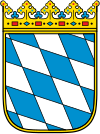 Free State of Bavaria |
 |
Landtag | 18th |  |
Government (111) CSU (84) Free Voters (27) Opposition (94) Alliance 90/The Greens (38) SPD (22) AfD (19) FDP (11) Non-inscrits (4) |
 |
Ilse Aigner CSU |
2018 | 2023 | |
 Berlin |

|
Abgeordnetenhaus | 18th (outgoing) | 
|
Government (92) SPD (38) The Left (27) Alliance 90/The Greens (27) Opposition (68) CDU (31) AfD (22) FDP (12) Non-inscrits (3) |

|
Ralf Wieland SPD |
2016 | 26 September 2021 | |
| 19th (incoming) | 
|
SPD (36) Alliance 90/The Greens (32) CDU (30) The Left (24) AfD (13) FDP (12) |
TBD | 2021 | 2026 | |||||
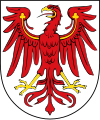 Brandenburg |
 |
Landtag | 7th |  |
Government (50) SPD (25) CDU (15) Alliance 90/The Greens (10) Opposition (38) AfD (23) The Left (10) BVB/Free Voters (5) |
 |
Ulrike Liedtke SPD |
2019 | 2024 | |
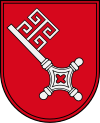 Free Hanseatic City of Bremen |
 |
Bürgerschaft | 20th |  |
Government (49) SPD (23) Alliance 90/The Greens (16) The Left (10) Opposition (35) CDU (24) FDP (5) AfD/Magnitz-Runge-Felgenträger (3) Non-inscrits (3) |
 |
Frank Imhoff CDU |
2019 | 2023 | |
 Free Hanseatic City of Hamburg |
 |
Bürgerschaft | 22nd |  |
Government (87) SPD (54) Alliance 90/The Greens (33) Opposition (36) CDU (15) The Left (13) AfD (6) Non-inscrits (2) |
 |
Carola Veit SPD |
2020 | 2025 | |
 Hesse |
 |
Landtag | 20th |  |
Government (69) CDU (40) Alliance 90/The Greens (29) Opposition (68) SPD (29) AfD (18) FDP (11) The Left (9) Non-inscrits (1) |
 |
Boris Rhein CDU |
2018 | 2023 | |
 Lower Saxony |
 |
Landtag | 18th |  |
Government (104) SPD (54) CDU (50) Opposition (33) Alliance 90/The Greens (12) FDP (11) Non-inscrits (10) |
 |
Gabriele Andretta SPD |
2017 | 2022 | |
 Mecklenburg-Vorpommern |

|
Landtag | 8th | 
|
SPD (34) AfD (14) CDU (12) The Left (9) Alliance 90/The Greens (5) FDP (5) (government formation not yet completed) |

|
Birgit Hesse SPD |
2021 | 2026 | |
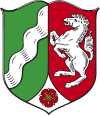 North Rhine-Westphalia |
 |
Landtag | 17th |  |
Government (100) CDU (72) FDP (28) Opposition (99) SPD (69) Alliance 90/The Greens (14) AfD (13) Non-inscrits (3) |
 |
André Kuper CDU |
2017 | 2022 | |
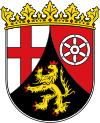 Rhineland-Palatinate |
 |
Landtag | 18th |  |
Government (55) SPD (39) Alliance 90/The Greens (10) FDP (6) Opposition (46) CDU (31) AfD (9) Free Voters (6) |
 |
Hendrik Hering SPD |
2021 | 2026 | |
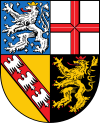 Saarland |
 |
Landtag | 16th |  |
Government (41) CDU (24) SPD (17) Opposition (10) The Left (6) AfD (3) Non-inscrits (1) |
Stephan Toscani CDU |
2017 | 2022 | ||
 Free State of Saxony |
 |
Landtag | 7th |  |
Government (67) CDU (45) Alliance 90/The Greens (12) SPD (10) Opposition (52) AfD (36)[a] The Left (14) Non-inscrits (2) |
 |
Matthias Rößler CDU |
2019 | 2024 | |
 Saxony-Anhalt |
 |
Landtag | 8th |  |
Government (56) CDU (40) SPD (9) FDP (7) Opposition (41) AfD (23) The Left (12) Alliance 90/The Greens (6) |
 |
Gunnar Schellenberger CDU |
2021 | 2026 | |
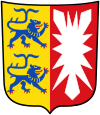 Schleswig-Holstein |
 |
Landtag | 19th |  |
Government (44) CDU (25) Alliance 90/The Greens (10) FDP (9) Opposition (29) SPD (21) AfD (4) SSW (3) Non-inscrits (1) |
 |
Klaus Schlie CDU |
2017 | 2022 | |
 Free State of Thuringia |
 |
Landtag | 7th |  |
Government (42) The Left (29) SPD (8) Alliance 90/The Greens (5) Opposition (48) AfD (21) CDU (21) FDP (4)[b] Non-inscrits (2) |
 |
Birgit Keller The Left |
2019 | 2024 |
- ^ According to their vote-share in the 2019 election, the AfD would be entitled to an additional seat, but their list was cut short after the 30th position before the election due to irregularities in the candidate-appointment and only eight of the party's constituency candidates, who did not also run on the state list, were successful. Therefore, the 120th seat of the Landtag will remain empty.
- ^ The standing rules of the Thuringia state parliament require a parliamentary group, to consist of at least five MPs; because one MP left the FDP group in the summer of 2021, the party now enjoys only a reduced small-group status, which nevertheless grants the party more rights than non-inscrit MPs, e.g. representation in committees.[4]
List Vice Chancellors
[edit]| Portrait | Name (Birth–Death) |
Term of Office | Political Party | Cabinet | Portfolio | |||
|---|---|---|---|---|---|---|---|---|
| Took office | Left office | Time in office | ||||||
| 1 | 
|
Franz Blücher (1896–1959) |
20 September 1949 | 29 October 1957 | 8 years, 30 days | FDP | Adenauer I Adenauer II |
Marshall Plan/Economic Cooperation |
| 2 | 
|
Ludwig Erhard (1897–1977) |
20 October 1957 | 17 October 1963 | 5 years, 362 days | CDU | Adenauer III Adenauer IV Adenauer V |
Economic Affairs |
| 3 | 
|
Erich Mende (1916–1998) |
17 October 1963 | 27 October 1966 | 3 years, 10 days | FDP | Erhard I Erhard II |
Intra-German Relations |
| 4 | 
|
Hans-Christoph Seebohm (1903–1967) |
27 October 1966 | 1 December 1966 | 35 days | CDU | Erhard II | Transport |
| 5 | 
|
Willy Brandt (1913–1992) |
1 December 1966 | 22 October 1969 | 2 years, 325 days | SPD | Kiesinger | Foreign Affairs |
| 6 | 
|
Walter Scheel (1919–2016) |
22 October 1969 | 17 May 1974 | 4 years, 207 days | FDP | Brandt I Brandt II |
Foreign Affairs |
| 7 | 
|
Hans-Dietrich Genscher (1927–2016) 1st term |
17 May 1974 | 17 September 1982 | 8 years, 123 days | FDP | Schmidt I Schmidt II Schmidt III |
Foreign Affairs |
| 8 | 
|
Egon Franke (1913–1995) |
17 September 1982 | 1 October 1982 | 14 days | SPD | Schmidt III | Intra-German Relations |
| 9 | 
|
Hans-Dietrich Genscher (1927–2016) 2nd term |
1 October 1982 | 17 May 1992 | 9 years, 229 days | FDP | Kohl I Kohl II Kohl III Kohl IV |
Foreign Affairs |
| 10 | 
|
Jürgen Möllemann (1945–2003) |
17 May 1992 | 21 January 1993 | 249 days | FDP | Kohl IV | Economic Affairs |
| 11 | 
|
Klaus Kinkel (1936–2019) |
21 January 1993 | 26 October 1998 | 5 years, 278 days | FDP | Kohl IV Kohl V |
Foreign Affairs |
| 12 | 
|
Joschka Fischer (b. 1948) |
26 October 1998 | 22 November 2005 | 7 years, 27 days | Alliance 90/The Greens | Schröder I Schröder II |
Foreign Affairs |
| 13 | 
|
Franz Müntefering (b. 1940) |
22 November 2005 | 21 November 2007 | 1 year, 364 days | SPD | Merkel I | Labour and Social Affairs |
| 14 | 
|
Frank-Walter Steinmeier (b. 1956) |
21 November 2007 | 27 October 2009 | 1 year, 340 days | SPD | Merkel I | Foreign Affairs |
| 15 | 
|
Guido Westerwelle (1961–2016) |
27 October 2009 | 16 May 2011 | 1 year, 201 days | FDP | Merkel II | Foreign Affairs |
| 16 | 
|
Philipp Rösler (b. 1973) |
16 May 2011 | 17 December 2013 | 2011|5|16|2013|12|17}} | FDP | Merkel II | Economic Affairs |
| 17 | 
|
Sigmar Gabriel (b. 1959) |
17 December 2013 | 14 March 2018 | 4 years, 87 days | SPD | Merkel III | Economic Affairs (2013–2017) Foreign Affairs (2017–2018) |
| 18 | 
|
Olaf Scholz (b. 1958) |
14 March 2018 | Incumbent | 6 years, 250 days | SPD | Merkel IV | Finance |
In the federal system of the Federal Republic of Germany, the state parliaments embody the legislative power in the sixteen states. In thirteen of the sixteen German states, the state parliament is known as the Landtag (an old German term that roughly means state parliament). In the states Free Hanseatic City of Bremen and Free and Hanseatic City of Hamburg, the state parliament is called Bürgerschaft (Citizenry), in Berlin it is called Abgeordnetenhaus (House of Representatives).
Election process, constitutional functions and powers
[edit]As the German constitution (Basic Law) defines the Federal Republic of Germany as a federation, each German state has its own constitution. The Basic Law gives the states a broad discretion to determine their respective state structure, only stating that each German state has to be a social and democratic republic under the rule of law and that the people in every state must have an elected representation, without giving further details (Article 28.1). In practice, all states are parliamentary republics in which the legislative branch of government is assigned to an elected parliament. Since the abolition of the Bavarian Senate in 1999, all sixteen state parliaments are unicameral.
Among the most important functions of the state parliaments are the election of the Minister President, the control of the state government and the adoption of state laws. They have no influence on federal legislation, but participate in the election of the President of Germany by electing state electors to the Federal Convention.
In terms of these functions, the state parliaments work very similarly. However, there are also some significant differences between the states. This begins with the electoral system: Similar to federal elections, many states use a mixed-member proportional representation system in which each voter casts one vote for a constituency candidate and a second vote determines the proportional share of seats. However, this is not the case in all states, the main exception being Baden-Württemberg, which uses a complex first-past-the-post voting system in which seats are allocated to "lucky-loser" candidates in addition to the elected constituency candidates in order to establish proportionality. In all states there is a 5%-threshold which must be exceeded for a party to be considered in the proportional distribution of seats, although in Bremen it is sufficient to exceed the threshold in only one of the two cities that make up the state (Bremen City and Bremerhaven). The electoral system of some states also includes a basic mandate clause which allows parties to be taken into account in the proportional distribution of seats regardless of the 5%-threshold if they win a certain number of constituencies. As at the federal level, parties representing national minorities are excluded from both the 5%-threshold and the basic mandate clause. This provision is of particular importance in Schleswig-Holstein, where the SSW, a party which represents the minorities of Danes and Frisians, regularly participates in state elections.
In contrast to the Bundestag on federal level, all states have adopted legislative periods of five years, with the sole exception of Bremen, which still uses four-year-terms (a cross-party attempt to introduce five-year-terms was defeated in a referendum in 2017[5]). Another difference to the Bundestag are the conditions for early new elections: While the Bundestag does not have the right of self-dissolution and can only be dissolved by the President of Germany (and even this only under certain conditions which are precisely defined in the Basic Law), the state parliaments have the right of self-dissolution (even if the procedure differs according to the state constitutions). In addition to this, some state constitutions also provide for an automatic dissolution of the parliament in certain situations and in some states, the parliament can also be dissolved by a referendum. Neither an automatic dissolution nor a dissolution by referendum has ever happened in any state, though.
| State | Name | Election system | Threshold conditions | Seats | Term | Premature dissolution procedures |
|---|---|---|---|---|---|---|
| Baden-Württemberg[6] | Landtag of Baden-Württemberg | first-past-the-post in 70 constituencies with at least 50 "lucky loser"-seats (Zweitmandate), in order to achieve proportional representation | 5% of votes statewide | 120+ | 5 years | -self dissolution (motion must be tabled by at least one quarter and accepted by at least two thirds of members) -referendum (request must be made by at least one sixth of the state population eligible to vote and must be accepted by a majority of the population eligible to vote) |
| Free State of Bavaria | Landtag of Bavaria | mixed-member proportional representation with two votes (both votes counting towards proportional representation) | 5% of votes statewide | 180+ | 5 years | -self dissolution (simple motion sufficient) -referendum (request must be made by at least one million citizens eligible to vote and must be accepted by a simple majority) -automatic dissolution (if the Landtag fails to elect a Minister President within four weeks after a vacancy occurred) |
| Berlin[7][8] | House of Representatives of Berlin | mixed-member proportional representation with two votes | 5% of second votes statewide or one constituency |
130+ | 5 years | -self dissolution (motion must be accepted by two thirds of members) -referendum (state constitution does not specify details) |
| Brandenburg | Landtag of Brandenburg | mixed-member proportional representation with two votes | 5% of second votes statewide or one constituency |
88+ (maximum of 110) | 5 years | -self dissolution (motion must be accepted by two thirds of members) |
| Free Hanseatic City of Bremen[9] | Bürgerschaft of Bremen | Personalized proportional representation with cumulative voting and panachage (five votes) in two seperate voting areas (Bremen City and Bremerhaven) | 5% of votes in one of the two voting areas | 84 (69 for Bremen City and 15 for Bremerhaven) | 4 years | -self dissolution (motion must be tabled by at least one third and must be accepted by at least two thirds of members) -referendum (request must be made by at least one fifth of the state population eligible to vote and must be accepted by a majority of the population eligible to vote) |
| Free Hanseatic City of Hamburg | Bürgerschaft of Hamburg | Personalized proportional representation with cumulative voting and panachage on state level and in multi member constituencies (10 votes: 5 for state lists, 5 for constituency candidates) | 5% of state list-votes | 121+ | 5 years | -self dissolution (motion must be tabled by at least one quarter and must be accepted by a majority of members) |
| Hesse | Landtag of Hesse | mixed-member proportional representation with two votes | 5% of second votes statewide | 110+ | 5 years | -self dissolution (motion must be accepted by a majority of members) |
| Lower Saxony | Landtag of Lower Saxony | mixed-member proportional representation with two votes | 5% of second votes statewide | 135+ | 5 years | -self dissolution (the state constitution defines two scenarios for a self dissolution: [A] one third of members may table a motion of self dissolution, which must be accepted by two thirds of members present, who have to equal at least a majority of all members [Art. 10]. [B] Nonwithstanding variant A, the Landtag may dissolve itself with a majority of members, if it has failed to elect a Minister President within 21 days after a vacancy occured – alternatively it may elect a Minister President with a plurality of votes [Art. 30]) |
| Mecklenburg-Vorpommern | Landtag of Mecklenburg-Vorpommern | mixed-member proportional representation with two votes | 5% of second votes statewide | 71+ | 5 years | -self dissolution (the state constitution defines two scenarios for a self dissolution: [A] one third of members may table a motion of self dissolution, which must be accepted by two thirds of members [Art. 42.2]. [B] Nonwithstanding variant A, the Landtag may dissolve itself with a majority of members, if it has failed to elect a Minister President within 28 days after a vacancy occured – alternatively it may elect a Minister President with a plurality of votes [Art. 30]) |
| North Rhine-Westphalia | Landtag of North Rhine-Westphalia | mixed-member proportional representation with two votes | 5% of second votes statewide | 181+ | 5 years | -self dissolution (motion must accepted by a majority of members) |
| Rhineland-Palatinate | Landtag of Rhineland-Palatinate | mixed-member proportional representation with two votes | 5% of second votes statewide | 101+ | 5 years | -self dissolution (simple motion) -automatic dissolution (if a motion of no confidence against the Minister President has been successfull and the Landtag fails to elect a new office-holder within four weeks) |
| Saarland | Landtag of Saarland | proportional representation with one vote, which counts both for a list in a multi member constituency and a state list | 5% of votes state wide | 51(+?)[a] | 5 years | -self dissolution (motion must be accepted by two thirds of members) -automatic dissolution (if a motion of no confidence against the Minister President has been successfull and the Landtag fails to elect a new office-holder within four weeks) |
| Free State of Saxony | Landtag of Saxony | mixed-member proportional representation with two votes | 5% of second votes statewide or two constituencies |
120+ | 5 years | -self dissolution (motion must be accepted by two thirds of members) -automatic dissolution (if the Landtag fails to elect a Minister President within four months after a vacancy occurred) |
| Saxony-Anhalt | Landtag of Saxony-Anhalt | mixed-member proportional representation with two votes | 5% of second votes statewide | 87+[b] | 5 years | -self dissolution (the state constitution defines two scenarios for a self dissolution: [A] one fourth of members may table a self dissolution motion, which has to be accepted by two thirds of members. This is however not possible during the first six months of a legislative period [Art. 60]. [B] Nonwithstanding variant A, the Landtag may dissolve itself with a majority of members, if it has failed to elect a Minister President on the first two ballots – alternatively it may elect a Minister President with a plurality of votes on the third ballot [Art. 65.2]) |
| Schleswig-Holstein | Landtag of Schleswig-Holstein | mixed-member proportional representation with two votes | 5% of second votes statewide or one constituency |
69+ | 5 years | -self dissolution (motion must be accepted by at least two thirds of members) |
| Free State of Thuringia | Landtag of Thuringia | mixed-member proportional representation with two votes | 5% of secon votes statewide | 88+ | 5 years | -self dissolution (motion must be tabled by at least one third and must be accepted by at least two thirds of members) -automatic dissolution (if the Minister President has lost a confidence motion and the Landtag fails to elect a new Minister President within 21 days) |
- ^ The electoral system of Saarland has a regulatory gap for the (unlikely but theoretically possible) case that a party is proportionally entitled to more seats in the multi member constituencies than would be the case on state level. The election law code does not state, whether this would lead to overhang or even compensation seats or whether the relevant party would lose its entitlement to the overhang mandates.[10]
- ^ With effect to the next state election it was decided to reduce the number of seats to 83. Overhang and compensation seats remain possible.
| Plenar hall | Name | Legislative period |
Diagram | Composition | Presidium | Last election | Next election | |
|---|---|---|---|---|---|---|---|---|
 Baden-Württemberg |
 |
Landtag | 16th |  |
Government (90) Alliance 90/The Greens (47) CDU (43) Opposition (53) SPD (19) AfD (18) FDP (12) Non-inscrits (4) |
Muhterem Aras (Alliance 90/The Greens) President Sabine Kurtz (CDU) Vice President |
2016 | 2021 |
 Free State of Bavaria |
 |
Landtag | 18th |  |
Government (112) CSU (85) Free Voters (27) Opposition (93) Alliance 90/The Greens (38) SPD (22) AfD (20) FDP (11) Non-inscrits (2) |
Ilse Aigner (CSU) President Karl Freller (CSU) Thomas Gering (Alliance 90/The Greens) Alexander Hold (Free Voters) Markus Rinderspacher (SPD) Wolfgang Heubisch (FDP) Vice Presidents |
2018 | 2023 |
 Berlin |
 |
Abgeordnetenhaus | 18th |  |
Government (92) SPD (38) The Left (27) Alliance 90/The Greens (27) Opposition (68) CDU (31) AfD (22) FDP (12) Non-inscrits (3) |
Ralf Wieland (SPD) President Cornelia Seibeld (CDU) Manuela Schmidt (The Left) Vice Presidents |
2016 | 2021 |
 Brandenburg |
 |
Landtag | 7th |  |
Government (50) SPD (25) CDU (15) Alliance 90/The Greens (10) Opposition (38) AfD (23) The Left (10) BVB/Free Voters (5) |
Ulrike Liedtke (SPD) President Andreas Galau (AfD) Barbara Richstein (CDU) Vice Presidents |
2019 | 2024 |
 Free Hanseatic City of Bremen |
 |
Bürgerschaft | 20th |  |
Government (49) SPD (23) Alliance 90/The Greens (16) The Left (10) Opposition (35) CDU (24) FDP (5) AfD (3) Non-inscrits (3) |
Frank Imhoff (CDU) President Sülmez Dogan (Alliance 90/The Greens) Antje Grotheer (SPD) Vice Presidents |
2019 | 2023 |
 Free Hanseatic City of Hamburg |
 |
Bürgerschaft | 22nd |  |
SPD (54) Alliance 90/The Greens (33) CDU (15) The Left (13) AfD (7) Non-inscrits (1) Government-formation process not completed, acting cabinet consists of SPD and Alliance 90/The Greens |
Carola Veit (SPD) President André Trepoll (CDU) Deniz Çelik (The Left) Vice Presidents |
2020 | 2025 |
 Hesse |
 |
Landtag | 20th |  |
Government (69) CDU (40) Alliance 90/The Greens (29) Opposition (68) SPD (29) AfD (18) FDP (11) The Left (9) Non-inscrits (1) |
Boris Rhein (CDU) President Frank Lortz (CDU) Karin Müller (Alliance 90/The Greens) Heike Hofmann (SPD) Jörg-Uwe Hahn (FDP) Ulrich Wilken (The Left) Vice Presidents |
2018 | 2023 |
 Lower Saxony |
 |
Landtag | 18th |  |
Government (104) SPD (54) CDU (50) Opposition (33) Alliance 90/The Greens (12) FDP (11) AfD (9) Non-inscrits (1) |
Gabriela Andretta (SPD) President Petra Emmerich-Kopatsch (SPD) Bernd Busemann (CDU) Frank Oesterhellweg (CDU) Meta Janssen-Kucz (Alliance 90/The Greens) Vice Presidents |
2017 | 2022 |
 Mecklenburg-Vorpommern |
 |
Landtag | 7th |  |
Government (44) SPD (26) CDU (18) Opposition (27) AfD (14) The Left (11) Non-inscrits (2) |
Birgit Hesse (SPD) President Beate Schlupp (CDU) Mignon Schwenke (The Left) Vice Presidents |
2016 | 2021 |
 North Rhine-Westphalia |
 |
Landtag | 17th |  |
Government (100) CDU (72) FDP (28) Opposition (99) SPD (69) Alliance 90/The Greens (14) AfD (13) Non-inscrits (3) |
André Kuper (CDU) President Carina Gödecke (SPD) Angela Freimuth (FDP) Oliver Keymis (Alliance 90/The Greens) Vice Presidents |
2017 | 2022 |
 Rhineland-Palatinate |
 |
Landtag | 17th |  |
Government (51) SPD (39) FDP (6) Alliance 90/The Greens (6) Opposition (50) CDU (35) AfD (12) Non-inscrits (3) |
Hendrik Hering (SPD) President Astrid Schmitt (SPD) Hans-Josef Bracht (CDU) Vice Presidents |
2016 | 2021 |
 Saarland |
 |
Landtag | 16th |  |
Government (41) CDU (24) SPD (17) Opposition (10) The Left (6) AfD (3) Non-inscrits (1) |
Stephan Toscani (CDU) President Isolde Fries (SPD) Günter Heinrich (CDU) Vice Presidents |
2017 | 2022 |
 Free State of Saxony |
 |
Landtag | 7th |  |
Government (67) CDU (45) Alliance 90/The Greens (12) SPD (10) Opposition (52) AfD (38)[a] The Left (14) |
Matthias Rößler (CDU) President Andrea Dombois (CDU) André Wendt (AfD) Luise Neuhaus-Wartenberg (The Left) Vice Presidents |
2019 | 2024 |
 Saxony-Anhalt |
 |
Landtag | 7th |  |
Government (46) CDU (30) SPD (11) Alliance 90/The Greens (5) Opposition (41) AfD (21) The Left (16) Non-inscrits (4) |
Gabriele Brakebusch (CDU) President Willi Mittelstädt (AfD) Wulf Gallert (The Left) Vice Presidents |
2016 | 2021 |
 Schleswig-Holstein |
 |
Landtag | 19th |  |
Government (44) CDU (25) Alliance 90/The Greens (10) FDP (9) Opposition (29) SPD (21) AfD (4) SSW (3) Non-inscrits (1) |
Klaus Schlie (CDU) President Kirsten Eickhoff-Weber (SPD) Aminata Touré (Alliance 90/The Greens) Annabell Krämer (FDP) Vice Presidents |
2017 | 2022 |
 Free State of Thuringia |
 |
Landtag | 7th |  |
Government (42) The Left (29) SPD (8) Alliance 90/The Greens (5) Confidence and Supply (21) CDU (21) Opposition (27) AfD (22) FDP (5) |
Birgit Keller (The Left) President Michael Kaufmann (AfD) Henry Worm (CDU) Dorothea Marx (SPD) Astrid Rothe-Beinlich (Alliance 90/The Greens) Dirk Bergner (FDP) Vice Presidents |
2019 | 2024[b] |
- ^ According to their vote-share in the 2019 election, the AfD would be entitled to a 39th seat, but their list was cut short after the 30th position before the election due to irregularities in the candidate-appointment and only eight of the party's constituency candidates, who did not also run on the state list, were successfull. Therefore, the 120th seat of the Landtag will remain empty.
- ^ An election in 2024 is the default legal position. In their confidence and supply agreement (Stabilitätspakt) however, the minority-coalition parties and the CDU agreed on filing a self dissolution-motion early in 2021 and, if successful, dating a snap election to 25 April 2021.[11]
List of current Minister Presidents of Germany.
| № | Portrait | Name (Birth–Death) (Home State) |
Previous service | Term of Office | Political Party | Vice Chancellor | Cabinets | ||
|---|---|---|---|---|---|---|---|---|---|
| Took Office | Left Office | ||||||||
| Chancellor of the Federal Republic of Germany (Bundeskanzler) | |||||||||
| 1 | 
|
Konrad Adenauer (1876–1967) (North Rhine-Westphalia) |
President of the Parliamentary Council (1948-1949) | 15 September 1949 | 16 October 1963 (resigned) |
CDU | Franz Blücher (1949–1957), Ludwig Erhard (1957–1967) | Adenauer I, Adenauer II, Adenauer III, Adenauer IV, Adenauer V | |
| 2 | 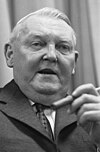
|
Ludwig Erhard (1897–1977) (Baden-Württemberg) |
Vice Chancellor of Germany (1957-1967) Federal Minister for Economic Affairs (1949–1963) |
16 October 1963 | 1 December 1966 (resigned) |
CDU | Erich Mende (1963-1966), Hans-Christoph Seebohm (1966) | Erhard I, Erhard II | |
| 3 | 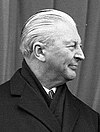
|
Kurt-Georg Kiesinger (1904–1988) (Baden-Württemberg) |
Minister President of Baden-Württemberg (1958–1966) | 1 December 1966 | 22 October 1969 | CDU | Willy Brandt (1966-1969) | Kiesinger | |
| 4 | 
|
Willy Brandt (1913–1992) (West Berlin) |
Vice Chancellor of Germany (1966–1969) Federal Minister of Foreign Affairs (1966–1969) |
22 October 1969 | 7 May 1974 (resigned) |
SPD | Walter Scheel (1969-1974, Acting Chancellor from 7 May 1974 until 16 May 1974) | Brandt I, Brandt II | |
| 5 | 
|
Helmut Schmidt (1918–2015) (Hamburg) |
Federal Minister of Finance (1972-1974) | 16 May 1974 | 1 October 1982 (replaced by a Constructive vote of no confidence) |
SPD | Hans-Dietrich Genscher (1974-1982), Egon Franke (1982) | Schmidt I, Schmidt II, Schmidt III | |
| 6 | 
|
Helmut Kohl (1930–2017) (Rhineland-Palatinate) |
Leader of the CDU/CSU group in the Bundestag (1976-1982) | 1 October 1982 | 27 October 1998 | CDU | Hans-Dietrich Genscher (1982-1992), Jürgen Möllemann (1992–1993), Klaus Kinkel (1993–1998) | Kohl I, Kohl II, Kohl III, Kohl IV, Kohl V | |
| 7 | 
|
Gerhard Schröder (b. 1944) (Lower Saxony) |
Minister President of Lower Saxony (1990–1998) | 27 October 1998 | 22 November 2005 | SPD | Joschka Fischer (1998-2005) | Schröder I, Schröder II | |
| 8 | 
|
Angela Merkel (b. 1954) (Mecklenburg-Vorpommern) |
Leader of the CDU/CSU group in the Bundestag (2002-2005) | 22 November 2005 | CDU | Franz Müntefering (2005-2007), Frank-Walter Steinmeier (2007–2009), Guido Westerwelle (2009–2011), Philipp Rösler (2011–2013), Sigmar Gabriel (2013–2018), Olaf Scholz (incumbent since 2018) | Merkel I, Merkel II, Merkel III, Merkel IV | ||
ARTICLE:
The Minister President is the head of state and government of a German state. In the three states of Berlin, Free Hanseatic City of Bremen and Free Hanseatic City of Hamburg the heads of the state hold different titles: Governing Mayor of Berlin, President of the Senate and Mayor of Bremen and First Mayor of Hamburg. Nevertheless, in Germany it is common practice, to call the sixteen heads of the states ministers president, if they are referred to collectively. For example, the regular meetings of the sixteen office-holders are called Conference of Ministers President (Ministerpräsidentenkonferenz).
Constitutional roles and powers
[edit]As the german constitution (Basic Law) defines the Federal Republic of Germany as a federation, each german state has it's own constitution. Although the Basic Law gives the states a broad discretion to determine their respective state structure, only stating that each german state has to be a social and democratic republic under the rule of law (Article 28.1), in practice all german states have adopted some form of a mixed parliamentary republican system: Despite some differences between the individual state constitutions, the Ministers President have both typical powers of an executive leader (for example appointing and dismissing cabinet members or defining the political guidelines of the cabinet) and typical powers and functions of a head of state (for example the power to grant pardons on behalf of the state and to perform certain ceremonial duties). As such, their powers and functions resemble those of an executive president, but in contrast to a presidential system, they are not directly elected and depend on the confidence of the respective state parliament. Thus, the constitutional position of a Minister President differs from that of the Chancellor of Germany at the federal level, who only holds the role of a chief executive leader, while the President of Germany performs the more ceremonial powers and functions of the federal head of state.
Even though all sixteen ministers president hold roughly the same position in their states, there are also some important differences between the provisions of the state constitutions with regard to the head of state and government. This begins with the election procedure: All ministers president are elected by the the state parliament, but while in some states a majority of parliament members is needed for a succesful election, in other states a simple majority (majority of votes cast) is sufficient. The same goes for recall procedures: In some states the parliament may simply vote an officeholder out of office, while in other states the parliament has to elect a new officeholder at the same time (Constructive vote of no confidence). In Bavaria the constitution does not allow a recall of the minister president at all. In fifteen states, the state constitution defines the minister president as the leader of the cabinet, giving him or her the right, to dermine the cabinet's political guidelines, but this is not the case in Bremen, were the President of the Senate and Mayor only has a ceremonial precedence over the other cabinet members. There are also differences regarding the ministers president power, to shape his or her cabinet: While in some states the office-holder is free to appoint or dismiss cabinet ministers at his or her discretion, in other states there are limits to this power, while the constitution of Bremen does not give the President of the Senate and Mayor any power, to directly influence the composition of his or her cabinet.
| State | Title | election threshold | recall procedure | position in cabinet | power to shape the cabinet | right to grant pardon | minimum age | other provisions |
|---|---|---|---|---|---|---|---|---|
| Baden-Württemberg[12] | Minister President | majority of members | constructive vote of no confidence | guideline competence | cabinet appointments subject to parliamentary approval, the state parliament may recall individual cabinet ministers with a two-thirds majority | yes | 35 | |
| Free State of Bavaria[13] | Minister President | simple majority | none, has to resign, if a cooperation with the state parliament is not possible anymore | guideline competence | cabinet appointments subject to parliamentary approval | yes | 40 | |
| Berlin[14] | Governing Mayor | simple majority | vote of no confidence, but if the state parliament does not elect a new Governing Mayor within 21 days, the former officeholder is reinvested automatically | guideline competence | full | no (whole cabinet) | 18 (de facto) | |
| Brandenburg[15] | Minister President | majority of members (first and second ballot), plurality (third ballot) | constructive vote of no confidence | guideline competence | full | yes | 18 (de facto) | |
| Free Hanseatic City of Bremen[16] | President of the Senate and Mayor | simple majority | constructive vote of no confidence | ceremonial precedence | none, all cabinet members are elected and may be recalled by the state parliament | no (whole cabinet) | 18 | may not be a member of the state parliament |
| Free Hanseatic City of Hamburg[17] | First Mayor | majority of members | constructive vote of no confidence | guideline competence | cabinet appointments subject to parliamentary approval | no (whole cabinet) | 18 | may not be a member of the state parliament |
| Hesse[18] | Minister President | majority of members | vote of no confidence | guideline competence | dismissal of a cabinet minister is subject to parliamentary approval | yes | 18 (de facto) | members of noble houses, which have reigned in Germany before 1918, are ineligible for office |
| Lower Saxony[19] | Minister President | majority of members or plurality, if the state parliament does not elect a Minister President in 21 days and does not dissolve itself thereupon | constructive vote of no confidence | guideline competence | cabinet appointments subject to parliamentary approval | yes | 18 (de facto) | |
| Mecklenburg-Vorpommern[20] | Minister President | majority of members or plurality, if the state parliament does not elect a Minister President in 28 days and does not dissolve itself thereupon | constructive vote of no confidence | guideline competence | full | yes | 18 (de facto) | |
| North Rhine-Westphalia[21] | Minister President | majority of members (first ballot), simple majority (second and third ballot), runoff (fourth ballot) | constructive vote of no confidence | guideline competence | full | yes | 18 | has to be a member of the state parliament |
| Rhineland-Palatinate[22] | Minister President | majority of members | vote of no confidence | guideline competence | full | yes | 18 (de facto) | |
| Saarland[23] | Minister President | majority of members | vote of no confidence | guideline competence | cabinet appointments and dismissals subject to parliamentary approval | no (whole cabinet) | 18 (de facto) | |
| Free State of Saxony[24] | Minister President | majority of members (first ballot), simple majority (following ballots) | constructive vote of no confidence | guideline competence | full | yes | 18 (de facto | |
| Saxony-Anhalt[25] | Minister President | majority of members or simple majority, if the state parliament does not elect a Minister President in 14 days and does not dissolve itself thereupon | constructive vote of no confidence | guideline competence | full | yes | 18 (de facto) | |
| Schleswig-Holstein[26] | Minister President | majority of members (first and second ballot), pluralitiy (third ballot) | constructive vote of no confidence | guideline competence | full | yes | 18 (de facto) | |
| Free State of Thuringia[27] | Minister President | majority of members (first and second ballot), pluralitiy (third ballot) | constructive vote of no confidence | guideline competence | full | yes | 18 (de facto) |
By virtue of their position in the Bundesrat, the ministers president can exert considerable influence on national politics within the federal structure. Along with several of their ministers, they commonly represent their state in the Bundesrat (the German Federal Council). Each state government is represented in the Bundesrat by 3 to 6 delegates, depending on the state's population.
Deputies
[edit]In most states the deputy of the Minister President holds the title Deputy Minister President, Saxony-Anhalt and Schleswig-Holstein have a higher ranking First Deputy Minister President and a lower ranking Second Deputy Minister President. Berlin has two equally ranking Mayors deputizing for the Governing Mayor, while Bremen has a Mayor deputizing for the President of the Senate and Mayor and Hamburg has a Second Mayor deputizing for the First Mayor.
List of current office-holders
[edit]
Trivia
[edit]The office of a Minister President is both highly prestigious in its own right and acts as a potential "career springboard" for German politicians. Four out of eight Chancellors of Germany have been head of a state before becoming Chancellor:
- Kurt-Georg Kiesinger, 3rd Minister President of Baden-Württemberg (1958-1966)
- Willy Brandt, 4th Governing Mayor of Berlin (1957-1966)
- Helmut Kohl, 3rd Minister President of Rhineland-Palatinate (1969-1976)
- Gerhard Schröder, 7th Minister President of Lower Saxony (1990-1998)
Three out of twelve Presidents of Germany have been head of a state before becoming President:
- Richard von Weizsäcker, 9th Governing Mayor of Berlin (1981-1984)
- Johannes Rau, 6th Minister President of North Rhine-Westphalia (1978-1998)
- Christian Wulff, 10th Minister President of Lower Saxony (2003-2010)
Many more Ministers President went on to become members of the federal government, EU institutions or associate judges of the Federal Constitutional Court of Germany for example.
There have been six female heads of a German state:
- Heide Simonis, 11th Minister President of Schleswig-Holstein (1993-2005)
- Christine Lieberknecht, 4th Minister President of Thuringia (2009-2014)
- Hannelore Kraft, 10th Minister President of North Rhine-Westphalia (2010-2017)
- Annegret Kramp-Karrenbauer, 7th Minister President of Saarland (2011-2018)
- Malu Dreyer, 8th Minister President of Rhineland-Palatinate (incumbent since 2013)
- Manuela Schwesig, 5th Minister President of Mecklenburg-Vorpommern (incumbent since 2017)
One person has managed to become Minister President of two different states:
- Bernhard Vogel, 4th Minister President of Rhineland-Palatinate (1976-1988) and 2nd Minister President of Thuringia (1992-2003)
References
[edit]- ^ Standing rules (Geschäftsordnung) of the German Bundestag, § 1 (2–3).
- ^ Standing rules (Geschäftsordnung) of the German Bundestag, § 8 (2).
- ^ "Wahltermine in Deutschland (2021, 2022 usw.)".
- ^ https://www.mdr.de/nachrichten/thueringen/fdp-fraktion-gruppe-rechte-geld-100.html
- ^ https://www.weser-kurier.de/deutschland-welt/bundestagswahl-2017_artikel,-volksentscheid-und-bundestagwahl-so-hat-bremen-abgestimmt-_arid,1651043.html
- ^ https://www.lpb-bw.de/bwverf/bwverf.htm#Landtag
- ^ https://www.berlin.de/rbmskzl/regierender-buergermeister/verfassung/artikel.41546.php
- ^ http://www.wahlrecht.de/landtage/berlin.htm
- ^ https://www.wahlrecht.de/landtage/bremen.htm
- ^ http://www.wahlrecht.de/landtage/regelungsluecke-saarland.html
- ^ https://www.mdr.de/thueringen/statement-gespraeche-linke-spd-gruene-cdu-100.html
- ^ https://www.lpb-bw.de/bwverf/Landesverfassung-BW.pdf
- ^ https://www.uni-augsburg.de/einrichtungen/gleichstellungsbeauftragte/downloads/bayerische_verfassung.pdf
- ^ http://www.datenschutz.fu-berlin.de/dahlem/ressourcen/datenschutz-fordert/rechtliche-datenschutzforderungen/verfassung-berlin.pdf
- ^ https://bravors.brandenburg.de/de/gesetze-212792
- ^ https://www.bremische-buergerschaft.de/fileadmin/user_upload/Informationsmaterial/LandesverfassungBremen_2016_web.pdf
- ^ http://www.landesrecht-hamburg.de/jportal/portal/page/bshaprod.psml?showdoccase=1&st=lr&doc.id=jlr-VerfHArahmen&doc.part=X&doc.origin=bs
- ^ http://starweb.hessen.de/cache/hessen/landtag/enquetekommissionverfassung/Hessische%20Verfassung.pdf
- ^ http://www.nds-voris.de/jportal/portal/t/13kl/page/bsvorisprod.psml/action/portlets.jw.MainAction?p1=10&eventSubmit_doNavigate=searchInSubtreeTOC&showdoccase=1&doc.hl=0&doc.id=jlr-VerfNDpArt29&doc.part=S&toc.poskey=#focuspoint
- ^ https://www.landtag-mv.de/fileadmin/media/Dokumente/Druckerzeugnisse/LT_Verfassung_01-2012.pdf
- ^ https://www.krefeld.de/C1257478002CCFBA/html/48CCFE93623BD475C12574F10052F97F/$File/Verfassung_fuer_das_Land_NRW.pdf?OpenElement
- ^ https://www.rlp.de/fileadmin/user_upload/Landesverfassung.pdf
- ^ https://www.landtag-saar.de/Dokumente/Gesetze/Verfassung%20des%20Saarlandes.pdf
- ^ https://www.revosax.sachsen.de/vorschrift/3975-Verfassung
- ^ http://www.landesrecht.sachsen-anhalt.de/jportal/?quelle=jlink&query=Verf+ST&psml=bssahprod.psml&max=true&aiz=true
- ^ http://www.gesetze-rechtsprechung.sh.juris.de/jportal/?quelle=jlink&query=Verf+SH&psml=bsshoprod.psml&max=true&aiz=true
- ^ http://www.landtag.thueringen.de/landtag/gremien-und-rechtsgrundlagen/rechtsgrundlagen/landesverfassung/
Amtierende Pokalsieger und Rekordpokalsieger
[edit]| Pokalwettbewerb | Amtierender Pokalsieger | Rekordpokalsieger |
|---|---|---|
| 20px Badischer Pokal | 20px Karlsruher SC | 20px SV Sandhausen (12) |
| 20px Bayerischer Pokal | 20px 1. FC Schweinfurt 05 | 20px SSV Jahn Regensburg (7) |
| 20px Berliner Landespokal | 20px BFC Dynamo | 20px Tennis Borussia Berlin (16) |
| 20px Brandenburgischer Landespokal | 20px FC Energie Cottbus | 20px SV Babelsberg 03 (9) |
| Beispiel | Beispiel | Beispiel |
| Beispiel | Beispiel | Beispiel |
| Beispiel | Beispiel | Beispiel |
| Beispiel | Beispiel | Beispiel |
| Beispiel | Beispiel | Beispiel |
| Beispiel | Beispiel | Beispiel |
| Beispiel | Beispiel | Beispiel |
| Beispiel | Beispiel | Beispiel |
| Beispiel | Beispiel | Beispiel |
| Beispiel | Beispiel | Beispiel |
| Beispiel | Beispiel | Beispiel |
| Beispiel | Beispiel | Beispiel |
| Beispiel | Beispiel | Beispiel |
| Beispiel | Beispiel | Beispiel |
| Beispiel | Beispiel | Beispiel |
| Beispiel | Beispiel | Beispiel |
| Beispiel | Beispiel | Beispiel |









